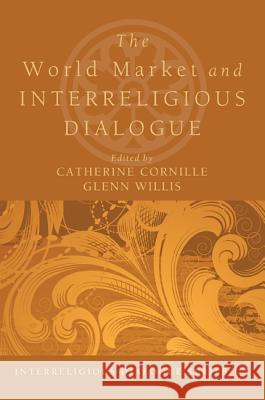The World Market and Interreligious Dialogue » książka
The World Market and Interreligious Dialogue
ISBN-13: 9781610975001 / Angielski / Miękka / 2011 / 318 str.
The World Market and Interreligious Dialogue
ISBN-13: 9781610975001 / Angielski / Miękka / 2011 / 318 str.
(netto: 140,01 VAT: 5%)
Najniższa cena z 30 dni: 146,19
ok. 16-18 dni roboczych.
Darmowa dostawa!
Description: The fair and equitable distribution of wealth and the cultivation of proper attitudes toward material goods and economic development concern all religious traditions alike. In so far as the dynamics of the world market or the global economic system transcend the competency and control of any particular religion, dialogue between religions, as well as between religionists and economists becomes both possible and necessary. This volume brings together religious thinkers from various traditions as well as economists to reflect on the possibilities and the challenges of such dialogue. Endorsements: ""This book can't be more relevant because of the subject and the perspective it gives. But more than that, the occasion of its publication is more than opportune, at a moment where economics is the great concern for the whole world and threatens everyday life all around the globe. The relevant contribution religions can bring to that is organized with competence and creativity by Catherine Cornille and Glen Willis. It is mandatory reading for those working with economics and also for those who work with religious social thought of any confession and tradition."" -Maria Clara Bingemer Professor of Systematic Theology Catholic University of Riode Janeiro, Brazil ""At last a book in which scholars of religion and economics reach beyond their respective disciplines to address structural, political, and personal ways to understand and surmount financial hardship at both local and national levels. This collection of essays leads the way for a multidisciplinary dialogue not only on questions of economic development but also on the dangers of free market theism and the value of interrogating the moral underpinnings of market realities."" -Andy Rotman Smith College ""This probing study of the interaction between religion and economics is urgently needed. It makes a unique contribution. Not since the work of Max Weber has the question received the intellectual attention it clearly deserves in our world marked by deep inequalities between rich and poor. This book raises challenging questions and proposes stimulating solutions that will demand equally serious exploration in the years ahead."" -David Hollenbach, SJ Boston College About the Contributor(s): Catherine Cornille is Associate Professor of Comparative Theology at Boston College. She is author of The Im-Possibility of Interreligious Dialogue (2008), and editor of Song Divine: Christian Commentaries on the Bhagavadgita (2006), Criteria of Discernment in Interreligious Dialogue (Cascade Books, 2009), and Interreligious Hermeneutics (Cascade Books, 2010). She is managing editor of the series Christian Commentaries on Non-Christian Sacred Texts. Glenn Willis is a doctoral candidate in Comparative Theology at Boston College, working in the area of Buddhist-Christian dialogue.
Description:The fair and equitable distribution of wealth and the cultivation of proper attitudes toward material goods and economic development concern all religious traditions alike. In so far as the dynamics of the world market or the global economic system transcend the competency and control of any particular religion, dialogue between religions, as well as between religionists and economists becomes both possible and necessary. This volume brings together religious thinkers from various traditions as well as economists to reflect on the possibilities and the challenges of such dialogue.Endorsements:""This book cant be more relevant because of the subject and the perspective it gives. But more than that, the occasion of its publication is more than opportune, at a moment where economics is the great concern for the whole world and threatens everyday life all around the globe. The relevant contribution religions can bring to that is organized with competence and creativity by Catherine Cornille and Glen Willis. It is mandatory reading for those working with economics and also for those who work with religious social thought of any confession and tradition.""-Maria Clara Bingemer Professor of Systematic TheologyCatholic University of Riode Janeiro, Brazil""At last a book in which scholars of religion and economics reach beyond their respective disciplines to address structural, political, and personal ways to understand and surmount financial hardship at both local and national levels. This collection of essays leads the way for a multidisciplinary dialogue not only on questions of economic development but also on the dangers of free market theism and the value of interrogating the moral underpinnings of market realities.""-Andy RotmanSmith College""This probing study of the interaction between religion and economics is urgently needed. It makes a unique contribution. Not since the work of Max Weber has the question received the intellectual attention it clearly deserves in our world marked by deep inequalities between rich and poor. This book raises challenging questions and proposes stimulating solutions that will demand equally serious exploration in the years ahead.""-David Hollenbach, SJBoston CollegeAbout the Contributor(s):Catherine Cornille is Associate Professor of Comparative Theology at Boston College. She is author of The Im-Possibility of Interreligious Dialogue (2008), and editor of Song Divine: Christian Commentaries on the Bhagavadgita (2006), Criteria of Discernment in Interreligious Dialogue (Cascade Books, 2009), and Interreligious Hermeneutics (Cascade Books, 2010). She is managing editor of the series Christian Commentaries on Non-Christian Sacred Texts.Glenn Willis is a doctoral candidate in Comparative Theology at Boston College, working in the area of Buddhist-Christian dialogue.











